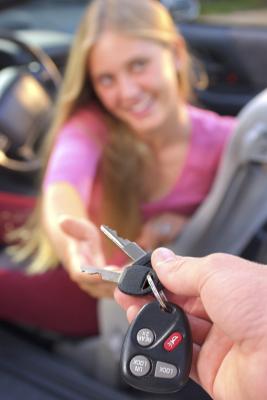
A learner's permit is one of the first steps to obtaining a valid driver's license. Each state's motor vehicle division determines the requirements to qualify for a permit. While each state's rules vary, most require that new drivers submit an application, complete some form of written or practical testing, and pay a fee.
Each state requires new drivers to apply for a learner's permit at the state's motor vehicle division. The minimum age to obtain a learners permit varies by state and ranges from 14 to 16. Adults over age 16 also can apply for a learner's permit if they are new drivers. Underage drivers must apply with a parent or legal guardian. When you arrive at the motor vehicle office, be prepared with the following information:
Proof of identity, such as a birth certificate or school ID
Proof of Social Security number
*Proof of residency. A parent's driver's license, utility bill or other document showing your address is sufficient if you are underage
Driver's must pass a written exam to receive a learner's permit. DMV.org states that most motor vehicle departments require applicants to score 70 percent or better to pass. State motor vehicle divisions publish their study manual online or offer a hard copy at the local office free of charge so drivers can prepare for the exam. The exam is multiple choice and includes questions that test your knowledge of local motor vehicle laws and safe driving habits. Testing is available online or at the local motor vehicle office. A fee often is charged to sit for the exam. Once complete, you will take a photo and receive the permit if you passed the exam. If you failed, you must wait and try again another day.
Permit drivers do not have the same privileges as a licensed driver. For example, permit drivers cannot operate a vehicle while alone. In most cases, permit driver's must be accompanied by a parent, legal guardian or other adult who has a valid driver's license. Some permits restrict drivers to only driving during the day. Many states require permit drivers to complete a formal driver's education course and/or have a specific number of supervised hours behind the wheel before issuing a driver's license.
Similar to a regular driver's license, learner's permits expire. Most states allow drivers the opportunity to renew the permit to satisfy the requirements needed to obtain a full license. You may continue to drive under the restrictions of the permit until ready to apply for a driver's license. Further, if you take the license exam and fail, you can continue to use the permit until successful.